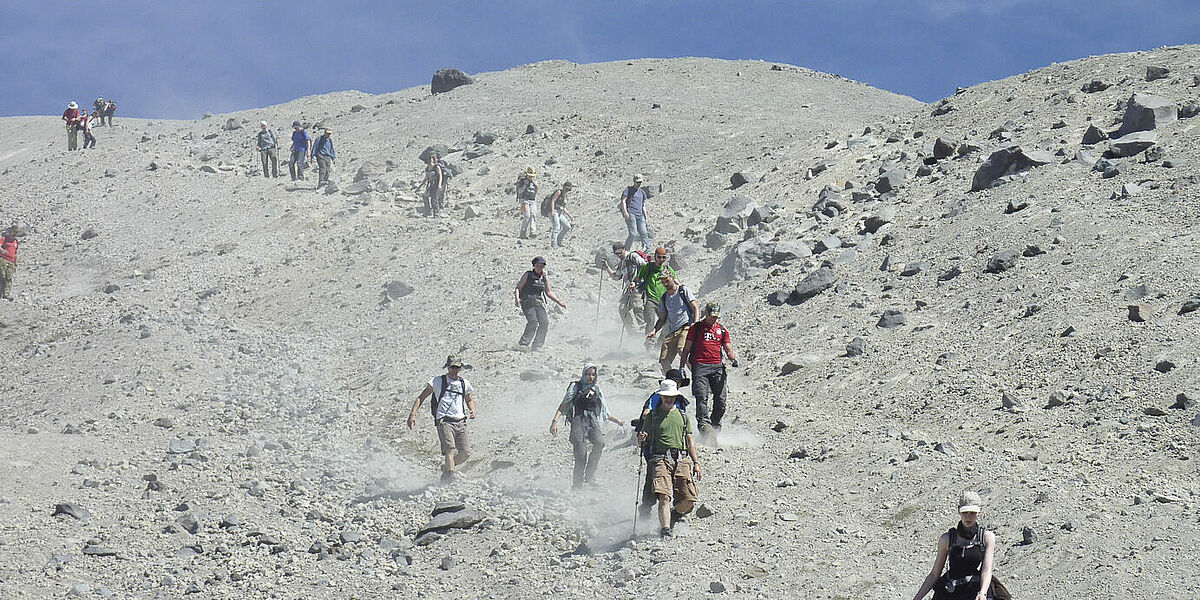Five compulsory modules provide important basic knowledge in the fields of landscape ecology, environmental economics and environmental ethics. Students must take part in international excursions and do a research internship which is designed to help them improve their scientific working skills.
Students can also customise their study plan according to their interests; there is a variety of elective modules. There are more than 50 modules from the fields of
- Biology (zoology, botany, microbiology)
- Landscape ecology and ecosystem dynamics
- Peatland sciences
- Environmental economics
- Environmental ethics
- Limnology
- Geography and geology
and others to choose from. Due to capacity limits in some elective modules and because of an inevitable overlap of courses, it is not possible to guarantee every combination of elective modules within the regular length of study for the master’s degree course.
At the end of the degree course, the students will have to write their master's thesis.
Modules
The master’s degree course has the following 5 compulsory modules with a total of 30 ECTS (900 hours):
| Code | Module |
|---|---|
| B1 | Landscape Ecology and Economics |
| B2 | Ethics and Environment |
| B3 | International Excursion |
| B4 | Research Internship |
| B5 | Personal Profiling |
The 4 credits (ETCS) for the module "Personal Profiling" can be freely selected from the courses provided by the University of Greifswald, unless the chosen subject has already been studied during a former degree.
10 elective modules with a scope of 60 ECTS (1800 hours) must be completed: At least 8 of the chosen modules must be marked, the best 7 modules will count towards the final grade
| Code | Module |
|---|---|
| E1 | Umweltökonomie |
| E2 | Landnutzung II |
| E3 | Cost Benefit Analysis |
| E4 | Economic Valuation of Natural Resources |
| E5 | Peatland Utilisation |
| E6 | Wissenschaftstheoretische und ethische Aspekte des Naturschutzes |
| E7 | Umweltethische Konzepte und ihre Umsetzung |
| E8 | Botanical Species Conservation 1 (Plant Species Conservation) |
| E9 | Botanical Species Conservation 2 (Population Biology) |
| E10 | Conservation Genetics of Plants 1 (Reproductive Biology) |
| E11 | Conservation Genetics of Plants 2 (Population Genetics) |
| E12 | Experimental Plant Ecology 1 |
| E13 | Experimental Plant Ecology 2 |
| E14 | Ornithology 1 |
| E15 | Ornithology 2 |
| E16 | Animal Conservation & Ecology 1 |
| E17 | Animal Conservation & Ecology 2 |
| E18 | Vegetation Ecology 1 |
| E19 | Vegetation Ecology 2 |
| E20 | General and Applied Aquatic Ecology |
| E21 | Aquatic Ecology – Summer Course |
| E22 | Conservation and Behaviour 1 |
| E23 | Conservation and Behaviour 2 |
| E24 | Conservation Genetics 1 |
| E25 | Conservation Genetics 2 |
| E26 | Aquatische Mikrobiologie 1 |
| E27 | Aquatische Mikrobiologie 2 |
| E28 | Mikrobielle Ökologie I – Energieflüsse & Stoffkreisläufe |
| E29 | Mikrobielle Ökologie II – Molekulare Ökologie & Interaktionen |
| E30 | Biology of Reproduction in Animals 1 (Behaviour, Mechanisms & Strategies) |
| E31 | Biology of Reproduction in Animals 2 (Behavioural Ecology) |
| E32 | Plant Stress Physiology |
| E33 | Großpraktikum Stressphysiologie der Pflanze |
| E34 | Climate Change |
| E35 | Dendrochronology |
| E36 | Environmental Hydrogeology |
| E37 | Facies Analysis of Glacial Deposits |
| E38 | Quartäre Geoarchive |
| E39 | Geoarchäologie |
| E40 | Paläontologie |
| E41 | Paläoökologie und Evolution |
| E42 | Organismen in Raum und Zeit |
| E43 | Restoration Ecology |
| E44 | Mire Ecology and Regionality |
| E45 | Quaternary Palaeoecology |
| E46 | Peatlands and Palaeoecology |
| E47 | Ecology & Protection of Ecosystems in the Southern Hemisphere & the Tropics |
| E48 | Bodenökologie |
| E49 | Naturräume Osteuropas |
| E50 | Geographische Informationssysteme: Vertiefung |
| E51 | Advanced Field Skills |
| E52 | Projektmanagement |
| E53 | Moderne Fremdsprachen |
| E54 | Internship (externes Berufspraktikum) |
Please note: You cannot select a module that you have already taken during your undergraduate degree, unless the contents of the course are significantly different! The latter has to be confirmed by the Examination Board.

